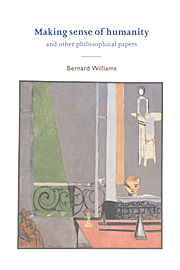Book contents
- Frontmatter
- Contents
- Preface
- I Action, freedom, responsibility
- II Philosophy, evolution, and the human sciences
- III Ethics
- 13 The point of view of the universe: Sidgwick and the ambitions of ethics
- 14 Ethics and the fabric of the world
- 15 What does intuitionism imply?
- 16 Professional morality and its dispositions
- 17 Who needs ethical knowledge?
- 18 Which slopes are slippery?
- 19 Resenting one's own existence
- 20 Must a concern for the environment be centred on human beings?
- 21 Moral luck: a postscript
- Index
19 - Resenting one's own existence
Published online by Cambridge University Press: 28 January 2010
- Frontmatter
- Contents
- Preface
- I Action, freedom, responsibility
- II Philosophy, evolution, and the human sciences
- III Ethics
- 13 The point of view of the universe: Sidgwick and the ambitions of ethics
- 14 Ethics and the fabric of the world
- 15 What does intuitionism imply?
- 16 Professional morality and its dispositions
- 17 Who needs ethical knowledge?
- 18 Which slopes are slippery?
- 19 Resenting one's own existence
- 20 Must a concern for the environment be centred on human beings?
- 21 Moral luck: a postscript
- Index
Summary
We distinguish in general between the case in which two thoughts (statements, speakers) refer to one and the same object, and that in which they refer to two distinct but similar objects. We distinguish, that is to say, between identity and mere similarity.
The notion of identity relevant to the present discussion is not so much identity over time as identity in relation to possibilities. Given a particular object, we can consider various ways in which its properties might have differed from the properties it actually has; yet it can retain its identity through these speculations – we are all the time thinking about the same thing. If Robert had been born in France (as he might have been, if his mother, pregnant with him, had gone there), then …’ seems a speculation of this kind; one about an alternative possible life-history of the person Robert. In other cases, however, the thoughts start with a particular object, but do not succeed in preserving its identity through the speculations. The possibilities invoked in that case are not possibilities involving that object, but rather possibilities involving some other, perhaps similar, object that might have existed instead. ‘If Robert had been the son of his mother's first fiancé, then …’ is not genuinely a thought about Robert, but about someone else, with a different father, who might have existed instead of Robert.
The question whether a possibility preserves identity or not is not the same as the question of how similar the object in the imagined circumstances would be to the object in the actual circumstances.
- Type
- Chapter
- Information
- Making Sense of HumanityAnd Other Philosophical Papers 1982–1993, pp. 224 - 232Publisher: Cambridge University PressPrint publication year: 1995
- 9
- Cited by



